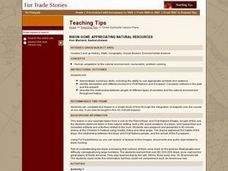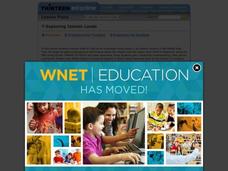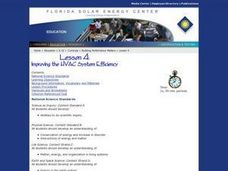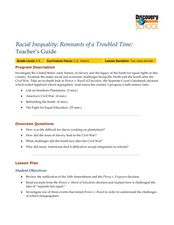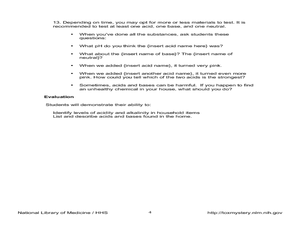Curated OER
Living With Risk: The Human Element of Natural Disasters
Students explore human elements that are a part of natural disasters, read a Hawaiian myth, conduct a survey, discuss why people choose to live in high risk areas, and participate in a writing activity based on studenT real life accounts...
Curated OER
Reaching Across Borders In Southern Africa
Students gain a greater understanding of how political borders impact human and environmental development. Then, either individually or as a class, establish a correspondence with a Peace Corps volunteer working in Africa.
Curated OER
Legends of Airpower: Aviation-Then, Now and Here
Students examine the advancements made in aviation during and since WWII. They read an interview with Charles McGee, research a plane, build a model of a plane, and develop a Powerpoint presentation about aircraft.
Curated OER
Saudi Arabia
High schoolers view a video clip about bombings in Saudi Arabia. They discuss the causes and implications of other recent terrorist attacks. They examine the United States - Saudi Arabia relationship as well.
Curated OER
Bison Gone: Appreciating Natural Resources
Young scholars examine the effects of the loss of the bison after the Europeans arrived in North America. They conduct a demonstration using beans to demonstrate the difference between the number of bison before and after the arrival of...
Curated OER
Do As the Romans: Construct an Aqueduct!
Students explore how the Romans engineered and built aqueducts. They read a manual, explore the Construct a Roman Aqueduct online activity, and construct an aqueduct that will transport two liters of water across a short distance in the...
Curated OER
Barbara Jordan
Learners examine the contributions made to our country by Barbara Jordan. They read and discuss the books "The Sneetches" and "Building a Bridge," write journal entries, participate in a discrimination simulation, create a class...
Curated OER
Exploring Islamic Lands
High schoolers examine the lives of Islamic teens. In this global studies lesson, students explore selected Internet sites to discover the attributes of Islam, the cultural traditions of Islam, and information regarding Middle Eastern...
Curated OER
Create a "Hero" Trophy
Students identify American heroes. In this research skills lesson, students discuss the characteristics of heroes and examine society's definition of heroes. Students research selected American heroes of the 20th century and create...
Curated OER
Natural Inquirer
Students explore the research process. In this scientific method instructional activity, students analyze data from an article, write their own informational article and express what they have learned. Students create their own article...
Curated OER
Stream Table
Students explore channelization, riparian habitats and soil erosion to find out about the aquatic habitats in Iowa. In this aquatic habitats lesson, students define important terms and read an article about pollution. ...
Curated OER
Rainforest
Students examine how important the rainforest and its resources are for our everyday survival in the future.
Curated OER
Digital Divide
Students research different "divides" and apply their research to the Digital Divide. They determine the race, gender and socioeconomic issues involved in this issue and why it is relevant.
Curated OER
Improving the HVAC System
Students describe the components of an HVAC system and determine which factors influence how efficient the system can be. They work together to develop hypotheses about the systems and their cost effectiveness and efficiency.
Curated OER
Tornadoes
Students examine the characteristics of a tornado. They practice using new vocabulary and participate in a question and answer session. They use the internet to gather more specific information.
Curated OER
Natural Born Robots: Body Builders
Students perform activities to explore how their arm works and what muscles are involved. They view animated comparisons of human and robotic arms. Students create a model of the human arm.
Curated OER
Racial Inequality: Remnants of a Troubled Time
Students watch the Discovery program "Racial Inequality: Remnants of a Troubled Time" then examine the ratification of the 14th Amendment and the Plessy v. Ferguson decision. They research one of three events that tested Brown v. Board...
Alabama Learning Exchange
The Five Senses: How They Relate to our World
Students explore the five senses and the significance of each sense. In this five senses and diversity lesson, students listen to You Can't Smell a Flower With Your Ear by Joanna Cole and take a walk observing opportunities to use all...
Curated OER
The Sahara: Home of the Tuareg
Students study inhabitants of the Sahara. In this Tuareg culture lesson, students explore the how the Tuareg people adapt to their environment as they research specific Internet sites.
Curated OER
ToxMystery Lesson Plan 2 : Case Book: Catch That Hazard!!!
Students explore toxic hazards. In this personal health activity, students discover appropriate uses for household chemicals as they identify potentially harmful products in their homes.
Curated OER
Acid or Base? Toxie's on the Case
Students recognize the difference between acids and bases. For this ToxMystery lesson, students play a computer game and experiment to find the difference between acids and bases. Students use litmus paper to determine if household...
Curated OER
East Meets West: Americans on the Move
High schoolers imagine what it was like to be part of the Lewis and Clark expedition. In this Lewis and Clark Expedition lesson, students watch "East Meets West: Americans on the Move," and then write journal entries from the...
Curated OER
Farm to Lunch: Exploring Agricultural Careers
Fourth graders examine Utah's economic structure and learn about agricultural careers. In this agricultural careers lesson, 4th graders follow agricultural products from their source to the lunch table. Students chart their results...
Curated OER
Bison on the Plains
Fifth graders explore U.S. geography by reading assigned text about American Indians. In this migration lesson, 5th graders identify the differences between Native Americans and European settlers who traveled through middle America in...






